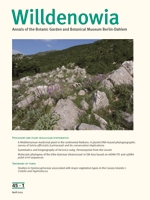In the present study, nucleotide sequences of the nrDNA ITS and the plastid DNA psbA-trnH region were used to reconstruct the phylogeny of the tribe Astereae in SW Asia using parsimony, Bayesian and likelihood methods. The ITS analysis showed that the SW Asian representatives of the tribe divide into two groups. One group arises just above the African lineage, while the second is part of the large Australasian polytomy at the crown of the tribe. SW Asian Aster, Crinitina, Galatella, Lachnophyllum and Psychrogeton appear to be non-monophyletic, whereas Chamaegeron, Eurasian Erigeron and Myriactis are monophyletic. Dichrocephala integrifolia is allied with S African members of subtribe Grangeinae. Chamaegeron and Lachnophyllum gossypinum are sister taxa and both are allied with the Bellis and Galatella group. Aster bachtiaricus is the earliest diverging branch of a large polytomy at the crown of the tribe. Psychrogeton species form three distinct clades. Heteropappus altaicus is nested in the Aster clade. Conyzanthus squamatus is nested within Symphyotrichum species.
How to translate text using browser tools
17 March 2015
Molecular phylogeny of the tribe Astereae (Asteraceae) in SW Asia based on nrDNA ITS and cpDNA psbA-trnH sequences
Farzaneh Jafari,
Shahrokh Kazempour Osaloo,
Valiollah Mozffarian

Willdenowia
Vol. 45 • No. 1
Apr 2015
Vol. 45 • No. 1
Apr 2015
ASTER
Chamaegeron
Compositae
Galatella
Lachnophyllum
Psychrogeton




